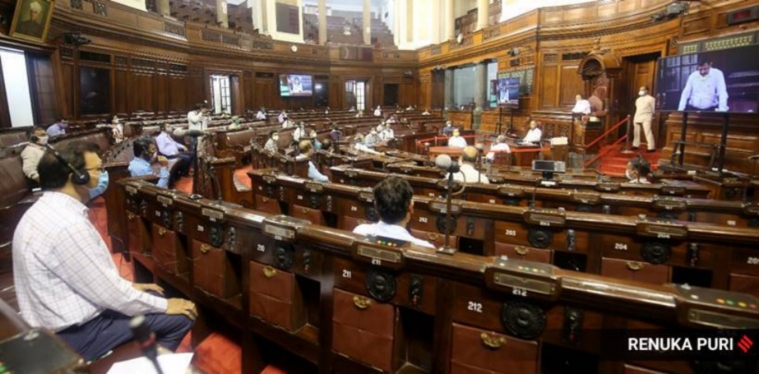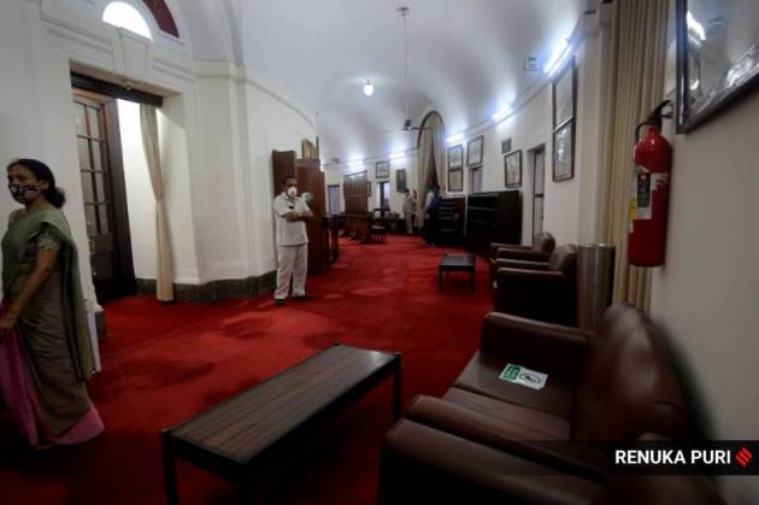
The Indian Express
Amid Covid, Parliament session tomorrow; Oppn seeks to corner govt over economy, border row
Starting September 14, both the houses will function without breaks, including on Saturdays and Sundays, till October 1.
by Express Web DeskAfter a considerable delay due to the Covid-19 pandemic, the 18-day monsoon session of Parliament is all set to kick off on Monday, with many firsts, including sitting of the two Houses in shifts without any off day. Moreover, the Question Hour has also been done away with, much to the chagrin of the Opposition. Meeting for the first time since proceedings were halted on March 23, just two days before the nation-wide lockdown was imposed, both the Lok Sabha and Rajya Sabha will have certain Covid-19 protocols in place and a new seating arrangement following social distancing guidelines has been prepared.
Precautionary measures against Covid-19
After exploring a number of possibilities, including virtual and hybrid meetings for the monsoon session, the presiding officers of both the Lok Sabha and Rajya Sabha have decided to conduct a fully physical session. According to the current plan, while members of the Lower House could be seated in the chamber of Lok Sabha, its galleries, the chamber of Rajya Sabha and its galleries, the elders could sit in both the chambers for the meetings. Sanitation will be done between the shifts. Face masks have also been made compulsory for all within the premises.
Apart from following basic sanitisation protocols and social distancing in both the houses, the ministers, MPs, officials, mediapersons and others entering the Parliament have to be tested Covid negative. Lok Sabha speaker Om Birla had said all those entering the premises would have to undergo the test at least 72 hours before the start of the session.
https://images.indianexpress.com/2020/08/1x1.png
In view of the pandemic, the session will be held in two shifts — 9 am to 1 pm and 3 pm to 7 pm. Barring the first day, Rajya Sabha will sit in the morning shift and Lok Sabha in the evening.
No question hour
The Monsoon session of Parliament, cut short due to the pandemic, will not have Question Hour, during which Members of Parliament ask questions to ministers and hold them accountable for the functioning of their ministries. Zero Hour, during which members raise matters of public importance, will also be curtailed and there will be no private members’ Bill.
Protesting the move, Opposition leaders accused the government of trying to reduce Parliament to a “notice board”. In the face of criticism from the Opposition party against doing away with the Question hour, Parliamentary Affairs Minister Prahlad Joshi said the government is ready to take up unstarred questions. Members get answers to unstarred questions in writing, and it is deemed to be laid on the table of the House.
Opposition strategy for monsoon session
The Congress and other opposition parties are set to oppose four of the 11 legislations the government proposes to bring in this Parliament session in place of ordinances issued earlier and expects Prime Minister Narendra Modi to reply to their concerns.
Party leader Jairam Ramesh Sunday said the Congress was in touch with other like-minded parties and had decided to oppose the three agriculture-related legislations and the amendment to the Banking Regulation Act in both houses.

Like-minded opposition parties have decided to come up with a joint strategy to take on the government on important issues such as handling of the pandemic, the state of the economy and the tense situation at the China border in Ladakh.
Speaking at a virtual press conference, Ramesh said, “We want a discussion in the Lok Sabha and the Rajya Sabha on the situation at the border with China, the state of the economy, the closure of businesses and the state of the MSME industry, the handling of the COVID-19 pandemic and other issues like airport privatisation, the draft EIA notification.”
BJP set to counter Opposition attack
According to BJP sources, the ruling party too is preparing to counter the Opposition’s possible attacks on the tension with China, the controversy over the PM CARES fund, issues of migrant labourers and unemployment and the economic situation apart from the government’s handling of the pandemic. Members are also expected to push discussion on the flood situation and the controversy over a Wall Street Journal report on Facebook.
However, lack of unity among the Opposition and the recent internal crisis in the Congress could weaken the Opposition’s attack on the government, BJP leaders said.
First day business
On the very first day, the Centre is all set to withdraw Banking Regulation (Amendment) Bill, 2020, for its fresh introduction. Finance Minister Nirmala Sitharaman will move a proposal in the Lok Sabha for the same. The Bill was introduced during the Budget Session in the lower House on March 3 this year to amend the Banking Regulation Act, 1949.
Later in the day, Pralhad Joshi will introduce the salary, allowances and pension of Members of Parliament (Amendment) Bill, 2020, Lok Sabha legislative business list said.
The Bill seeks immediate legislation by promulgation of the salary, allowances and pension of Members of Parliament (Amendment) Ordinance, 2020. It is among the 23 new Bills, including 11 replacing ordinances, listed by the government for the monsoon session.
Opinion | Coercive federalism on display
Consumer Affairs, Food and Public Distribution Minister Ram Vilas Paswan will then introduce the Essential Commodities (Amendment) Bill, 2020 to amend the Essential Commodities Act, 1955.
Union Minister for Health Dr Harsh Vardhan will introduce the Assisted Reproductive Technology (Regulation) Bill, 2020 seeking the regulation and supervision of the assisted reproductive technology clinics and the assisted reproductive technology banks, prevention of misuse, safe and ethical practice of assisted reproductive technology services.
Sitharaman will also move to introduce the Bilateral Netting of Qualified Financial Contracts Bill, 2020. The Bill seeks to ensure financial stability and promote competitiveness in Indian financial markets by providing enforceability of bilateral netting of qualified financial contracts. The Minister will also introduce the Factoring Regulation (Amendment) Bill, 2020 to amend the Factoring Regulation Act, 2011.
In Photos | This is how Parliament Monsoon session will start amid Covid-19 pandemic
Union Agriculture Minister Narendra Singh Tomar will introduce the Farmers’ Produce Trade and Commerce (Promotion and Facilitation) Bill, 2020, seeking creation of an ecosystem where the farmers and traders enjoy the freedom of choice relating to sale and purchase of farmers’ produce.
The Bill will facilitate remunerative prices through competitive alternative trading channels to promote efficient, transparent and barrier-free inter-state and intra-State trade and commerce of farmers’ produce outside physical premises of markets or deemed markets notified under various state agricultural produce market legislations. It will also be beneficial for electronic trading.

Tomar will lay an explanatory statement before the house for immediate legislation by promulgation of the Farmers’ Produce Trade and Commerce (Promotion and Facilitation) Ordinance, 2020, with the introduction of the Bill.
The Agriculture Minister will also introduce the Farmers (Empowerment and Protection) Agreement of Price Assurance and Farm Services Bill, 2020. The purpose of the Bill is to provide for a national framework on farming agreements that protects and empowers farmers to engage with agri-business firms, processors, wholesalers, exporters or large retailers for farm services and sale of future farming produce at a mutually agreed remunerative price framework in a fair and transparent manner.
The Bill also replaces the Farmers (Empowerment and Protection) Agreement on Price Assurance and Farm Services Ordinance, 2020.
Union AYUSH Minister Shripad Yesso Naik will move the National Commission for Homeopathy Bill, 2020, seeking improvement in the medical education system ensuring availability of adequate and high quality Homeopathy medical professionals across the country. The Bill promotes equitable and universal healthcare that encourages community health perspective and makes services of Homeopathy medical professionals accessible to all the citizens.
The Bill also promotes national health goals, encourages Homeopathy medical professionals to adopt latest medical research in their work and to contribute to research; an objective periodic and transparent assessment of medical institutions and facilitates maintenance of a Homeopathy medical register for India and enforces high ethical standards in all aspects of medical services. It is flexible to adapt to the changing needs and has an effective grievance redressal mechanism.
The other Bill that Naik is slated to move in the Parliament is the National Commission for Indian System of Medicine Bill, 2020.
The Bill aims at providing for a medical education system that improves access to quality and affordable medical education, ensures availability of adequate and high quality medical professionals of Indian System of Medicine in all parts of the country. It promotes equitable and universal healthcare that encourages community health perspective and makes services of such medical professionals accessible to all the citizens; that promotes national health goals.
The Bill also encourages such medical professionals to adopt latest medical research in their work and to contribute to research and has an objective periodic and transparent assessment of medical institutions and facilitates maintenance of a medical register of Indian System of Medicine for India and enforces high ethical standards in all aspects of medical services. It is flexible to adapt to the changing needs and has an effective grievance redressal mechanism.